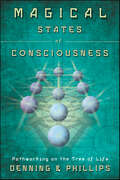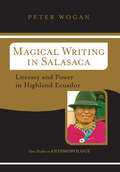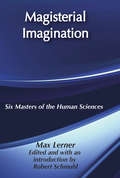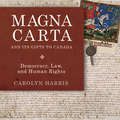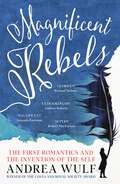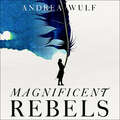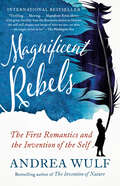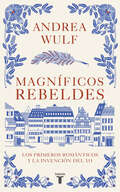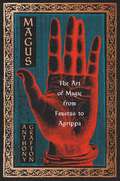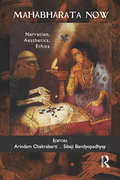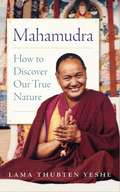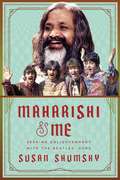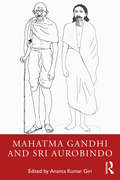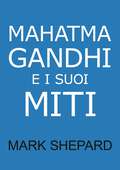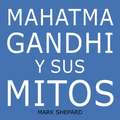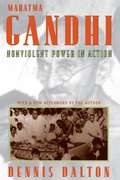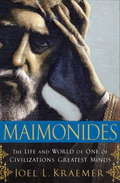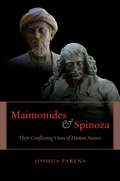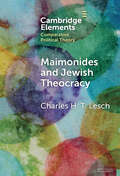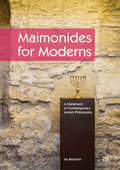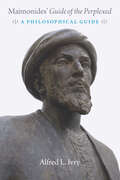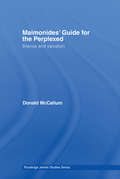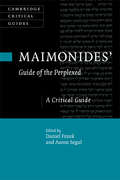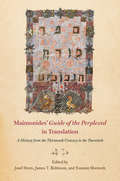- Table View
- List View
Magical States of Consciousness: Pathworking on the Tree of Life
by Melita DenningAvailable Once Again—the Groundbreaking Guide to Qabalistic PathworkingPathworking is one of the most powerful techniques employed in the practical Qabalah, the core of the Western Esoteric Tradition. Llewellyn is pleased to bring back—by popular demand—Magical States of Consciousness, the classic text by renowned magicians Osborne Phillips and the late Melita Denning that first made the practice of pathworking widely available.Revealed here are the methods by which deep dimensions of the human psyche may be reached—dimensions that give you access to profound knowledge and the power of creation. Ascend the Tree of Life to enter the Sphere of Tiphareth, the seat of the Higher Self. Train your mind and imagination, enhance your physical and emotional health, gain knowledge and spiritual initiation, experience adventure and self-empowerment—all through Qabalistic pathworking.Designed for both the beginner and the established mage, this sought-after book includes the complete narrative texts for the inward journeys of classic pathworking. Plus, mandalas are included that serve as gateways to altered states of consciousness and magical images of the Sephirothic archetypes—the sources of mystical power which exist not only cosmically but in the depths of each person's own being.
Magical Writing In Salasaca: Literacy And Power In Highland Ecuador (Case Studies in Anthropology)
by Peter WoganExplores the connections between beliefs about writing and power in an indigenous village in highland Ecuador.. This engaging case study of Salasaca, a village in highland Ecuador, examines indigenous beliefs about writing, such as Day of the Dead name lists, comparisons with weaving, and a witch who kills people listed in his book of names. Magical Writing in Salasaca demonstrates that these beliefs reflect extensive contact with birth certificates, baptism records, and other church and state documents. Wogan's inquiry into the place of literacy in the Salasacas' worldview provides a nuanced look at the power relations between elites and nonelite villagers, at the same time that it imparts an empathetic understanding of alternative ways of viewing ostensibly familiar aspects of the world. Magical Writing in Salasaca will appeal to anyone interested in anthropology, literacy, power, or Latin America.
Magisterial Imagination: Six Masters of the Human Science
by Max LernerThis work brings together Max Lemer's extended and enduring essays on Aristotle, Niccolb Machiavelli, Alexis de Tocqueville, John Stuart Mill, Thorstein Veblen, and Oliver Wendell Holmes, Jr. Combining biography and interpretation, Lerner insightfully examines a cluster of thinkers who helped shape his own influential work in political theory and civilizational analysis. Viewed collectively, these essays show Turner's method and mind at their best.Like Lerner himself, the masters were tough-minded realists—philosophers who saw human experience in all of its variety as central to study. Less inclined to metaphysical speculation, they wrestled with the real concerns and circumstances of therr times—but always within the larger context of ultimate meaning and consequence. Lerner eloquently introduces each philosopher and his work, but he also provides his own criticism and commentary. Complicated subjects are clearly presented, and cross-disciplinary analysis enhances the reader's sense of the whole.In his introduction, Robert Schmuhl discusses why Lerner was attracted to these particular thinkers and how they refined his approach to the human sciences. Schmuhl also traces the influence of these figures on Lemer's work. Magisterial Imagination will be of importance to philosophers, political theorists, and sociologists.
Magna Carta and Its Gifts to Canada: Democracy, Law, and Human Rights
by Carolyn HarrisA deep and gorgeous study of the Magna Carta and how it still influences our world. The year 2015 marks the 800th anniversary of the Magna Carta, the Great Charter imposed on King John by his barons in the thirteenth century to ensure he upheld traditional customs of the nobility. Though it began as a safeguard of the aristocracy, over the past 800 years, the Magna Carta has become a cornerstone of democratic ideals for all. After centuries of obscurity, the Magna Carta was rediscovered in the seventeenth century, and has informed numerous documents upholding human rights, including the American Declaration of Independence, the French Declaration of the Rights of Man, and the United Nations' Universal Declaration of Human Rights. For Canadians, it has informed key documents from the Royal Proclamation of 1763 that shaped the then-British Colonies and their relations with First Nations, to the Charter of Rights and Freedoms. This book complements the 2015 Magna Carta Canada exhibition of the Durham Cathedral Magna Carta and Charter of the Forest.
Magnificent Rebels: The First Romantics and the Invention of the Self
by Andrea Wulf'Elegantly written, deeply researched and totally gripping' SIMON SEBAG MONTEFIOREIn the 1790s an extraordinary group of friends changed the world. Disappointed by the French Revolution's rapid collapse into tyranny, what they wanted was nothing less than a revolution of the mind. The rulers of Europe had ordered their peoples how to think and act for too long. Based in the small German town of Jena, through poetry, drama, philosophy and science, they transformed the way we think about ourselves and the world around us. They were the first Romantics.Their way of understanding the world still frames our lives and being.We're still empowered by their daring leap into the self. We still think with their minds, see with their imagination and feel with their emotions. We also still walk the same tightrope between meaningful self-fulfilment and destructive narcissism, between the rights of the individual and our role as a member of our community and our responsibilities towards future generations who will inhabit this planet. This extraordinary group of friends changed our world. It is impossible to imagine our lives, thoughts and understanding without the foundation of their ground-breaking ideas.
Magnificent Rebels: The First Romantics and the Invention of the Self
by Andrea WulfFrom the Costa Prize-winning author of The Invention of Nature, Magnificent Rebels is a riveting, eye-opening biography of the first Romantics: a revolutionary group of friends based in the small German town of Jena whose modern ideas transformed society and the way we lead our lives today.In the 1790s an extraordinary group of friends changed the world. Disappointed by the French Revolution's rapid collapse into tyranny, what they wanted was nothing less than a revolution of the mind. The rulers of Europe had ordered their peoples how to think and act for too long. Based in the small German town of Jena, through poetry, drama, philosophy and science, they transformed the way we think about ourselves and the world around us. They were the first Romantics.Their way of understanding the world still frames our lives and being. We're still empowered by their daring leap into the self. We still think with their minds, see with their imagination and feel with their emotions. We also still walk the same tightrope between meaningful self-fulfilment and destructive narcissism, between the rights of the individual and our role as a member of our community and our responsibilities towards future generations who will inhabit this planet. This extraordinary group of friends changed our world. It is impossible to imagine our lives, thoughts and understanding without the foundation of their ground-breaking ideas.(P) 2022 Hodder & Stoughton Limited
Magnificent Rebels: The First Romantics and the Invention of the Self
by Andrea WulfA NEW YORKER ESSENTIAL READ • From the best-selling author of The Invention of Nature comes an exhilarating story about a remarkable group of young rebels—poets, novelists, philosophers—who, through their epic quarrels, passionate love stories, heartbreaking grief, and radical ideas launched Romanticism onto the world stage, inspiring some of the greatest thinkers of the time.A BEST BOOK OF THE YEAR: The New York Times • The Washington Post "Make[s] the reader feel as if they were in the room with the great personalities of the age, bearing witness to their insights and their vanities and rages.&” —Lauren Groff, best-selling author of MatrixWhen did we begin to be as self-centered as we are today? At what point did we expect to have the right to determine our own lives? When did we first ask the question, How can I be free?It all began in a quiet university town in Germany in the 1790s, when a group of playwrights, poets, and writers put the self at center stage in their thinking, their writing, and their lives. This brilliant circle included the famous poets Goethe, Schiller, and Novalis; the visionary philosophers Fichte, Schelling, and Hegel; the contentious Schlegel brothers; and, in a wonderful cameo, Alexander von Humboldt. And at the heart of this group was the formidable Caroline Schlegel, who sparked their dazzling conversations about the self, nature, identity, and freedom.The French revolutionaries may have changed the political landscape of Europe, but the young Romantics incited a revolution of the mind that transformed our world forever. We are still empowered by their daring leap into the self, and by their radical notions of the creative potential of the individual, the highest aspirations of art and science, the unity of nature, and the true meaning of freedom. We also still walk the same tightrope between meaningful self-fulfillment and destructive narcissism, between the rights of the individual and our responsibilities toward our community and future generations. At the heart of this inspiring book is the extremely modern tension between the dangers of selfishness and the thrilling possibilities of free will.
Magníficos rebeldes: Los primeros románticos y la invención del yo
by Andrea WulfLa aventura filosófica de un grupo de jóvenes rebeldes, el Círculo de Jena, que dio lugar al Romanticismo y a nuestra comprensión moderna de la libertad. EL REGRESO DE ANDREA WULF TRAS LA INVENCIÓN DE LA NATURALEZA «Magníficos rebeldes vibra con la pasión salvaje y las ideas radicales de un nuevo mundo libre creado a partir de la poesía, el sexo, la música y el romanticismo. Absolutamente fascinante».SIMON SEBAG MONTEFIORE ¿Cuándo empezamos a exigir el derecho a decidir sobre nuestras vidas? ¿En qué momento nos volvimos tan egocéntricos como lo somos hoy? ¿Cuándo nos planteamos por primera vez la pregunta «¿Cómo puedo ser libre?». Todo comenzó en una tranquila ciudad universitaria de Alemania en la década de 1790, cuando un grupo de dramaturgos, poetas y escritores pusieron el yo en el centro del escenario de su pensamiento, su escritura y sus vidas. Este brillante círculo incluía a los famosos poetas Goethe, Schiller y Novalis; a los visionarios filósofos Fichte, Schelling y Hegel; a los polémicos hermanos Schlegel; y, en un maravilloso cameo, a Alexander von Humboldt. En el corazón de este grupo estaba la formidable Caroline Schlegel, gran instigadora de sus deslumbrantes conversaciones sobre el yo, la naturaleza, la identidad y la libertad. La colaboración entre estas figuras lanzó el romanticismo al escenario mundial. En sus vidas exuberantes se nos revelan peleas épicas, historias de amor apasionadas, penas desgarradoras y, sobre todo, ideas radicales en torno al poder creativo del yo, así como las más altas aspiraciones del arte y la ciencia, la unidad de la naturaleza y el verdadero significado de la libertad. Así fue como estos jóvenes románticos incitaron una revolución mental que transformó nuestro mundo para siempre. Hoy seguimos avanzando por la misma cuerda floja entre la autorrealización personal y el narcisismo destructivo, entre los derechos individuales y las responsabilidades hacia la comunidad y las generaciones futuras. En el corazón de este libro inspirador se encuentra la tensión, extremadamente moderna, entre los peligros del egoísmo y las emocionantes posibilidades que ofrece la libertad del individuo. La crítica ha dicho:«Un libro magnífico: una revelación que podría convertirse fácilmente en una obsesión».The Spectator (UK) «Una exploración esclarecedora de la vida de la mente y de la producción de arte, a veces tensa».Kirkus Reviews «Una obra de una erudición formidable, pero llevada con ligereza; de compleja historia intelectual contada de forma evocadora, absorbente y convincente. La magnífica prosa de Wulf nos adentra en las vidas y las mentes de este notable círculo de personas que exploró las impresionantes posibilidades (y los tremendos riesgos) del libre albedrío, la creatividad individual y la libertad».Robert Macfarlane
Magus: The Art of Magic from Faustus to Agrippa
by Anthony GraftonA revelatory new account of the magus—the learned magician—and his place in the intellectual, social, and cultural world of Renaissance Europe.In literary legend, Faustus is the quintessential occult personality of early modern Europe. The historical Faustus, however, was something quite different: a magus—a learned magician fully embedded in the scholarly currents and public life of the Renaissance. And he was hardly the only one. Anthony Grafton argues that the magus in sixteenth-century Europe was a distinctive intellectual type, both different from and indebted to medieval counterparts as well as contemporaries like the engineer, the artist, the Christian humanist, and the religious reformer. Alongside these better-known figures, the magus had a transformative impact on his social world.Magus details the arts and experiences of learned magicians including Marsilio Ficino, Pico della Mirandola, Johannes Trithemius, and Heinrich Cornelius Agrippa. Grafton explores their methods, the knowledge they produced, the services they provided, and the overlapping political and social milieus to which they aspired—often, the circles of kings and princes. During the late fifteenth and early sixteenth centuries, these erudite men anchored debates about licit and illicit magic, the divine and the diabolical, and the nature of “good” and “bad” magicians. Over time, they turned magic into a complex art, which drew on contemporary engineering as well as classical astrology, probed the limits of what was acceptable in a changing society, and promised new ways to explore the self and exploit the cosmos.Resituating the magus in the social, cultural, and intellectual order of Renaissance Europe, Grafton sheds new light on both the recesses of the learned magician’s mind and the many worlds he inhabited.
Mahabharata Now: Narration, Aesthetics, Ethics
by Arindam Chakrabarti Sibaji BandyopadhyayThe Mahabharata is at once an archive and a living text, a sourcebook complete by itself and an open text perennially under construction. Driving home this striking contemporary relevance of the famous Indian epic, Mahabharata Now focuses on the issues of narration, aesthetics and ethics, as also their interlinkages. The cross-disciplinary essays in the volume imaginatively re-interpret the ‘timeless’ classic in the light of the pre-modern Indian narrative styles, poetics, aesthetic codes, and moral puzzles; the Western theories on modern ethics, aesthetics, metaphysics, psychoanalysis, and philosophy of science; and the contemporary social, ethical and political concerns. The essays are all united in their effort to situate the Mahabharata in the context of here and now without violating the sanctity of the ‘written text’ as we have it today. The book will be of interest to scholars and students of Indian and comparative philosophy, Indian and comparative literature, cultural studies, and history.
Mahamudra: How to Discover Our True Nature
by Lama YesheRelish these direct, experiential meditation instructions from the author of the bestselling Introduction to Tantra.Lama Yeshe tells us that mahamudra is “the universal reality of emptiness, of nonduality” and its unique characteristic is its emphasis on meditation: “With mahamudra meditation there is no doctrine, no theology, no philosophy, no God, no Buddha. Mahamudra is only experience.” He relies on the First Panchen Lama’s well-known Root Text of Genden Mahamudra, which in a few short pages provides the pith instructions for, first, overcoming distraction and resting in meditative stillness on the clarity of one’s own mind, and then by using a subtle wisdom, penetrating its ultimate nature, its emptiness. As always, Lama Yeshe’s words are direct, funny, and incredibly encouraging. He gets us to go beyond ego’s addiction to a limited sense of self and to taste the lightness and expansiveness of our own true nature.
Maharishi & Me: Seeking Enlightenment with the Beatles' Guru
by Susan ShumskySusan Shumsky is a successful author in the human potential field. But in the 1970s, in India, the Swiss Alps, and elsewhere, she served on the personal staff of the most famous guru of the 20th century—Maharishi Mahesh Yogi. Maharishi died in 2008 at age ninety, but his influence endures through the spiritual movement he founded: TM (Transcendental Meditation). Other books have been written about him, but this spellbinding page-turner offers a rare insider's view of life with the guru, including the time the Beatles studied at his feet in Rishikesh, India, and wrote dozens of songs under his influence. Both inspirational and disturbing, Maharishi and Me illuminates Susan's two decades living in Maharishi's ashrams, where she grew from a painfully shy teenage seeker into a spiritually aware teacher and author. It features behind-the-scenes, myth-busting stories, and over 100 photos of Maharishi and his celebrity disciples (the Beatles, Deepak Chopra, Mia Farrow, Beach Boys, and many more). Susan's candid, honest portrayal draws back the curtain on her shattering, extreme emotional seesaws of heaven and hell at her guru's hands. This compelling, haunting memoir will continue to challenge readers long after they turn its last page. It dismantles all previous beliefs about the spiritual path and how spiritual masters are supposed to behave. Susan shares: “Merely by being in his presence, we disciples entered an utterly timeless place and rapturous feeling, and, at the same time, realized the utter futility and insanity of the mundane world.” Susan's heartfelt masterwork blends her experiences, exacting research, artistically descriptive and humorous writing, emotional intelligence, and intensely personal inner exploration into a feast for thought and contemplation. Neither starry-eyed nor antagonistic, it captures, from a balanced viewpoint, the essence of life in an ashram.
Mahatma Gandhi and Sri Aurobindo
by Giri KumarThis book presents the first systematic critical exploration of the philosophical and political thoughts of Mahatma Gandhi and Sri Aurobindo, both pioneers of modern Indian thought. Bringing together experts from across the world, the volume examines the thoughts, ideas, actions, lives and experiments of Mahatma Gandhi and Sri Aurobindo on themes such as radical politics and human agency; ideals of human unity; social practices and citizenship; horizons of sustainable development and climate change; inclusive freedom; conceptions of swaraj; interpretations of texts; Sri Aurobindo’s views on Indian culture; integral yoga; transformative leadership; Anthropocene and alternative planetary futures. The book discusses the contemporary legacies and works of the two influential thinkers. It offers insights into historical, philosophical, theoretical, literary and sociological questions that establish the need for transdisciplinary dialogues and the relevance of their visions towards future evolution. This book will be useful to scholars and researchers of political science, Indian political thought, comparative politics, philosophy, Indian philosophy, sociology, anthropology, modern Indian history, peace studies, cultural studies, religious studies and South Asian studies.
Mahatma Gandhi e i suoi Miti: Disobbedienza civile, Nonviolenza e Satyagraha nel Mondo Reale
by Mark Shepard‘’Tutte le mie azioni trovano la loro fonte nel mio amore inalienabile per l’umanità’’ – Gandhi Mahatma Gandhi è una delle figure meno comprese di tutti i tempi – anche tra i suoi ammiratori. Nell’Annual Gandhi Lecture per l’International Association of Gandhian Studies, Mark Sheperd discute su alcune visioni avventate su Gandhi, offrendoci un quadro più accurato sulla persona e sul suo utilizzo della nonviolenza.
Mahatma Gandhi y sus mitos: Desobediencia civil, no violencia y Satyagraha en el mundo real
by Mark Shepard"Todas mis acciones tienen su origen en mi amor inalienable por la humanidad". - Gandhi Mahatma Gandhi es una de las figuras menos comprendidas de todos los tiempos, incluso entre sus admiradores. En esta Conferencia Anual de Gandhi para la Asociación Internacional de Estudios Gandhianos, Mark Shepard aborda algunas visiones persistentemente equivocadas de Gandhi, ofreciéndonos una imagen más precisa del hombre y su no violencia. "Un modelo de periodismo gandhiano ... [Shepard] ha señalado aparentemente todos los conceptos erróneos populares (y algunos menos comunes) tanto de Gandhi como de su filosofía, incluidos algunos particularmente importantes ... Este libro toma poco espacio para cubrir su tema de manera concisa y bien. Serían [algunas] de las páginas más valiosas que muchas personas podrían leer sobre Gandhi ". - Conciencia global, julio-septiembre. 1990
Mahatma Gandhi: Nonviolent Power in Action (Bibliographies And Indexes In World History #No. 42)
by Dennis DaltonDennis Dalton's classic account of Gandhi's political and intellectual development focuses on the leader's two signal triumphs: the civil disobedience movement (or salt satyagraha) of 1930 and the Calcutta fast of 1947. Dalton clearly demonstrates how Gandhi's lifelong career in national politics gave him the opportunity to develop and refine his ideals. He then concludes with a comparison of Gandhi's methods and the strategies of Martin Luther King Jr. and Malcolm X, drawing a fascinating juxtaposition that enriches the biography of all three figures and asserts Gandhi's relevance to the study of race and political leadership in America. Dalton situates Gandhi within the "clash of civilizations" debate, identifying the implications of his work on continuing nonviolent protests. He also extensively reviews Gandhian studies and adds a detailed chronology of events in Gandhi's life.
Maimonides
by Joel L. KraemerLeading scholars have combined forces to produce this volume on the philosophy and legal views of Moses Maimonides (1138-1204) and the historical context in which he worked.
Maimonides & Spinoza: Their Conflicting Views of Human Nature
by Joshua ParensUntil the last century, it was generally agreed that Maimonides was a great defender of Judaism, and Spinoza—as an Enlightenment advocate for secularization—among its key opponents. However, a new scholarly consensus has recently emerged that the teachings of the two philosophers were in fact much closer than was previously thought. In his perceptive new book, Joshua Parens sets out to challenge the now predominant view of Maimonides as a protomodern forerunner to Spinoza—and to show that a chief reason to read Maimonides is in fact to gain distance from our progressively secularized worldview.Turning the focus from Spinoza’s oft-analyzed Theologico-Political Treatise, this book has at its heart a nuanced analysis of his theory of human nature in the Ethics. Viewing this work in contrast to Maimonides’s Guide of the Perplexed, it makes clear that Spinoza can no longer be thought of as the founder of modern Jewish identity, nor should Maimonides be thought of as having paved the way for a modern secular worldview. Maimonides and Spinoza dramatically revises our understanding of both philosophers.
Maimonides and Jewish Theocracy: The Human Hand of Divine Rule (Elements in Comparative Political Theory)
by Charles H. LeschTheocratic movements are on the rise. But what does it actually mean for God to rule? This Element offers one answer by recovering the theocratic project of medieval Judaism's most important thinker, Moses Maimonides. Theocracy is often thought to quash human agency, evoking an overpowering deity and clerical domination. Yet by reconsidering Maimonides' debt to the Islamic philosopher al-Fārābī, and challenging Leo Strauss' influential reading, the author argues that among Maimonides' aims was to elevate humanity's role in divine rule. In its highest form reason is identical with revelation, action with providence. God's governance is delegated: theocracy requires human agency-the imitation of God. Maimonides focuses on philosophical-religious leaders. But he also broadens imitatio dei to anyone whose knowledge of God inspires love of God: By emulating God's goodness, we can become agents of divine rule. In this way, Maimonides' ideas suggest ways by which theocracy and democracy might, counter-intuitively, be reconciled.
Maimonides and Spinoza: Their Conflicting Views of Human Nature
by Joshua ParensUntil the last century, it was generally agreed that Maimonides was a great defender of Judaism, and Spinoza--as an Enlightenment advocate for secularization--among its key opponents. However, a new scholarly consensus has recently emerged that the teachings of the two philosophers were in fact much closer than was previously thought. In his perceptive new book, Joshua Parens sets out to challenge the now predominant view of Maimonides as a protomodern forerunner to Spinoza--and to show that a chief reason to read Maimonides is in fact to gain distance from our progressively secularized worldview. Turning the focus from Spinoza's oft-analyzed Theologico-Political Treatise, this book has at its heart a nuanced analysis of his theory of human nature in the Ethics. Viewing this work in contrast to Maimonides's Guide of the Perplexed, it makes clear that Spinoza can no longer be thought of as the founder of modern Jewish identity, nor should Maimonides be thought of as having paved the way for a modern secular worldview. Maimonides and Spinoza dramatically revises our understanding of both philosophers.
Maimonides for Moderns
by Ira BedzowThis book aims to construct a contemporary Jewish philosophy that accounts for virtue ethics or, rather, to give Jewish virtue ethics a contemporary language for its expression. Ira Bedzow draws significantly on the work of Moses Maimonides and his religio-philosophical explanation of Jewish ethics. However, Bedzow moves away from various aspects of Maimonides's Aristotelian biology, physics, metaphysics, and psychology. The objective of the volume is to integrate the normative principles of the Jewish tradition into everyday life. While the book translates Jewish ethics from a medieval, Aristotelian framework into a contemporary one, it also serves as a means for Judaism to continue as a living tradition.
Maimonides' "Guide of the Perplexed": A Philosophical Guide
by Alfred L. IvryA classic of medieval Jewish philosophy, Maimonides's Guide of the Perplexed is as influential as it is difficult and demanding. Not only does the work contain contrary--even contradictory--statements, but Maimonides deliberately wrote in a guarded and dissembling manner in order to convey different meanings to different readers, with the knowledge that many would resist his bold reformulations of God and his relation to mankind. As a result, for all the acclaim the Guide has received, comprehension of it has been unattainable to all but a few in every generation. Drawing on a lifetime of study, Alfred L. Ivry has written the definitive guide to the Guide--one that makes it comprehensible and exciting to even those relatively unacquainted with Maimonides' thought, while also offering an original and provocative interpretation that will command the interest of scholars. Ivry offers a chapter-by-chapter exposition of the widely accepted Shlomo Pines translation of the text along with a clear paraphrase that clarifies the key terms and concepts. Corresponding analyses take readers more deeply into the text, exploring the philosophical issues it raises, many dealing with metaphysics in both its ontological and epistemic aspects.
Maimonides' Guide for the Perplexed: Silence and Salvation (Routledge Jewish Studies Series)
by Donald McCallumProviding an excellent overview of the latest thinking in Maimonides studies, this book uses a novel philosophical approach to examine whether Maimonides' Guide for the Perplexed contains a naturalistic doctrine of salvation after death. The author examines the apparent tensions and contradictions in the Guide and explains them in terms of a modern philosophical interpretation rather than as evidence of some esoteric meaning hidden in the text.
Maimonides' Guide of the Perplexed: A Critical Guide (Cambridge Critical Guides)
by Daniel Frank Aaron SegalMoses Maimonides' Guide of the Perplexed (c. 1190) is the greatest and most influential text in the history of Jewish philosophy. Controversial in its day, the Guide directly influenced Aquinas, Spinoza, and Leibniz, and the history of Jewish philosophy took a decisive turn after its appearance. While there continues to be keen interest in Maimonides and his philosophy, this is the first scholarly collection in English devoted specifically to the Guide. It includes contributions from an international team of scholars addressing the most important philosophical themes that range over the three parts of this sprawling work - including topics in the philosophy of language, metaphysics, epistemology, philosophy of law, ethics, and political philosophy. There are also essays on the Guide's hermeneutic puzzles, and on its overall structure and philosophical trajectory. The volume will be of interest to philosophers, Judaists, theologians, and medievalists.
Maimonides' "Guide of the Perplexed" in Translation: A History from the Thirteenth Century to the Twentieth
by Josef Stern James T. Robinson Yonatan ShemeshMoses Maimonides’s Guide of the Perplexed is the greatest philosophical text in the history of Jewish thought and a major work of the Middle Ages. For almost all of its history, however, the Guide has been read and commented upon in translation—in Hebrew, Latin, Spanish, French, English, and other modern languages—rather than in its original Judeo-Arabic. This volume is the first to tell the story of the translations and translators of Maimonides’ Guide and its impact in translation on philosophy from the Middle Ages to the present day. A collection of essays by scholars from a range of disciplines, the book unfolds in two parts. The first traces the history of the translations of the Guide, from medieval to modern renditions. The second surveys its influence in translation on Latin scholastic, early modern, and contemporary Anglo-American philosophy, as well as its impact in translation on current scholarship. Interdisciplinary in approach, this book will be essential reading for philosophers, historians, and religious studies scholars alike.
